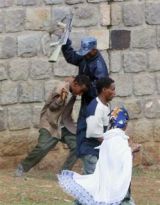Ethiopia’s post-poll violence toll triple earlier figure – MPs
Oct 26, 2006 (ADDIS ABABA) — An Ethiopian parliamentary probe has determined the death toll from post-election violence last year was triple the government’s earlier figure but found no evidence of excessive force by authorities, according to a report obtained Thursday.
 A panel investigating two explosions of unrest after the disputed May 2005 polls said 199 people, 193 civilians and six police, died in Addis Ababa and other cities, more than three times the original official number of 54, it said.
A panel investigating two explosions of unrest after the disputed May 2005 polls said 199 people, 193 civilians and six police, died in Addis Ababa and other cities, more than three times the original official number of 54, it said.
The figures match those given by the committee’s ex-vice chair, who is now in hiding, but officials dispute his contention that security forces violated human rights during the unrest and were guilty of committing a “massacre.”
The panel said some rights were “infringed,” but stressed it believed that Prime Minister Meles Zenawi’s government had “tried to do its best” to protect the population during the June and November violence.
“There were very unpleasant incidents in connection with the May 15, 2005, election,” chairman Mekonene Disasa told reporters at a news conference called after his former deputy alleged the government was suppressing the truth.
“The commission is deeply saddened about what happened,” Mekonene said.
He would not discuss details of the report, but the copy said Meles’ government, which has expressed regret for the deaths but insisted its reaction was appropriate, had not acted illegally.
“The commission doesn’t believe excessive force was used,” it said, maintaining that the response to violence that erupted during election protests had been “legal and necessary.”
“It prevented the country from going into worse conditions,” the report said. “Human rights conditions were infringed, the commission believes. But it believes the government tried to do its best in (protecting) human rights.”
At the weekend, Wolde-Michael Meshesha, a judge and former vice-chairman of the commission, accused the government of having threatened him and coerced the panel into changing its original determination of wrongdoing by authorities.
“According to our findings, this is a kind of massacre,” he said from Europe where he is now in hiding. “The government violated the (people’s) human rights.”
Wolde-Michael also said Meles had pressured the group — eight out of 10 of whom agreed that excessive force had been used, he claimed — to change the results and that he fled after refusing and receiving death threats.
Although Mekonene declined to discuss the content of the report, he denied the commission had come under any pressure to alter the document, which is to be sent to parliament next week.
“The commission knows itself and believes that it has done what it could freely and extensively,” he said.
In addition to the deaths, the report found that at least 763 civilians and 71 policemen were injured, 190 buses and 44 cars damaged during the unrest that happened as opposition groups protested the results.
Meles blamed the violence on the main opposition Coalition for Unity and Democracy (CUD), which authorities accuse of trying to foment a coup.
Nearly the entire CUD leadership is currently on trial on charges ranging from treason to genocide and conspiracy for calling for nationwide protests against the results of the polls that they allege were rigged.
Polling day conduct during Ethiopia’s 2005 elections, the country’s third free polls since the 1991 ouster of a Soviet-backed dictatorship, was widely lauded by international observers.
However, the opposition quickly accused Meles’ ruling Ethiopian People’s Revolutionary Democratic Front (EPRDF) of major improprieties in vote counting and alleged widespread fraud in the aftermath.
In its final report, the European Union said the polls fell well short of international standards, particularly in the handling of complaints that led to protests and then the deadly violence.
(AFP)
